
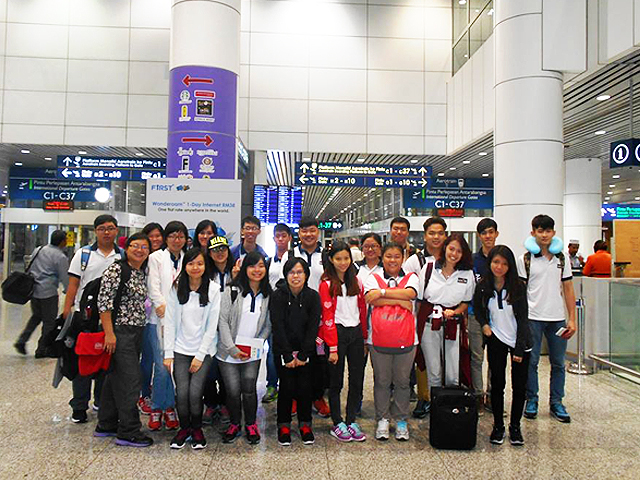
The students departing to Japan
It was an enriching 10-day study tour for 20 UTAR students when they visited Josai International University (JIU) in Japan from 28 September to 7 October 2016.
It was organised by UTAR Faculty of Business and Finance (FBF), and had FBF Dean Dr Au Yong Hui Nee and Centre for Extension Education (CEE) Kampar Head Mohd Faizul bin Ahmad accompanying them on their journey to learning the Japanese language and culture. Greeting the visitors with a warm welcoming party were JIU’s Faculty of Tourism Dean Prof Junichi Watanabe, staff and students.
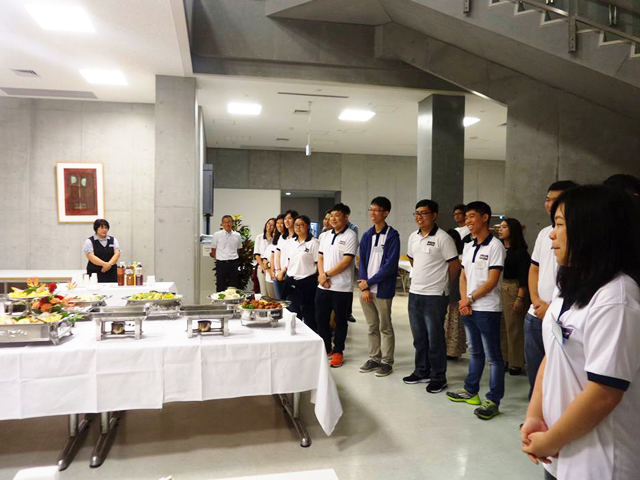
The students at the welcoming party
With much excitement, the second day saw students beginning their first lesson on Japanese language and culture with JIU Lecturer Yu Hang. Having been illuminated on Japanese culture, students also learnt the practical side of the culture through soba-making and bamboo craft classes, which provided greater understanding of Japanese culture.
Coming from Malaysia’s multicultural background, Psychology student Khoo Xin Ying said of the cultural class, “It helped me to reflect on my manners and attitudes toward our own culture and to learn from the Japanese on the importance of knowing and preserving our Malaysian cultures.”
In JIU Lecturer Ishitani Satoshi’s class, students were taught to speak in Japanese, while in Shibasaki Sayuri’s class they were further taught on ways to properly introduce themselves in Japanese as they conversed with their assigned Japanese partners.
Environmental Engineering student Doris Chin Zhi Xin recalled her enjoyable time conversing with her Japanese friend and mentioned, “Not only are we able to have fun in the class but we were also able to meet people from different walks of life.”
The fun lessons did not stop there, as students had the opportunity to enjoy tea at a traditional Japanese tea ceremony lesson with a specially-invited tea ceremony master, while JIU Lecturer Jang Dong Xing gave them a pleasant lesson on wearing kimonos.
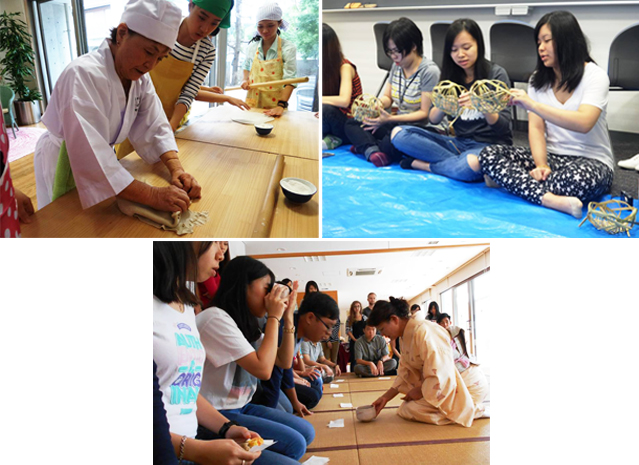
Clockwise from top left: Students at their soba-making class, bamboo craft class and tea ceremony class
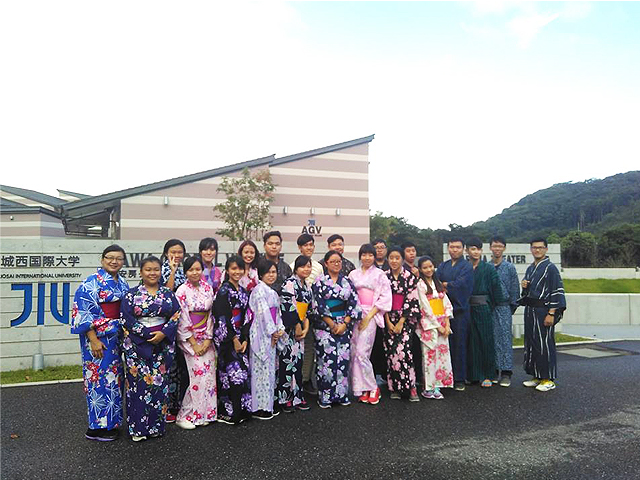
The students in their kimonos
Shodo calligraphy was taught by JIU Lecturer Iwamoto Hidekazu, who elucidated on the history of ancient Japanese writing, as well as teaching the students the art of writing Japanese characters using Fude brushes. This was followed by the class “Introduction to Tourism”, where students learnt of major concepts in tourism, what makes tourism possible, and the underlying factors that make tourism an important sector in Japan. Students were then tested on their newly acquired knowledge at the end of the class.
JIU Lecturer Umehara Ichigo went further in-depth on tourism focusing on “Hospitality Management”, teaching the students the business logic of the hotel industry. They learnt of satisfying the stakeholders through the good performance of the hotel staff, which is vital to make a business successful.
Working in teams, students became risk assessors in JIU Lecturer David Williams’ class, and were assigned to develop a four-year action plan for the redevelopment of an island. Based on the case study of Montserrat, the “Risk and Development in a Resort Island” assignment educated the students on weighing the opportunities versus the costs when conducting risk management.
Students also took on the role of marketers in the “Tourism Destination Marketing” class. JIU Lecturer Okada Toyokazu shed light on the basic framework of tourism destination marketing and the strategic marketing plans involved in making a tourist destination successful.
During their lessons in JIU, the students also had the honour of meeting JIU Chancellor Dr Noriko Mizuta, Vice President Prof Masumi Ishida and Kamogawa City Mayor Takao Hasegawa, and being taken to visit the birthplace of JIU and Josai University (JU) Founder Mikio Mizuta.
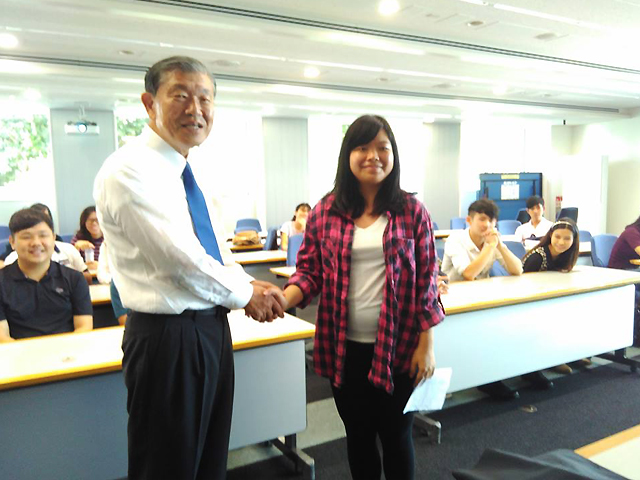
Hasegawa greeting the students
Not forgetting leisurely activities, students had fun with visits to the Kamogawa’s Sea World, promenade, shrine and the observatory deck. Time was also allocated for the students to visit Asakusa district for shopping and to the Akihabara district to indulge in Japanese anime, manga, video games, figurines and card games.
Their trip to Kawagoe’s Little Edo transported them back 140 years, when the city was under strict feudal government rule, famously known as the Edo Period which lasted for over 250 years. It was a nostalgic old town that gave students a chance to witness the “Kurazukuri”, a clay-walled warehouse-style building. Later on, they made a brief stop at JU’s Sakado Campus.
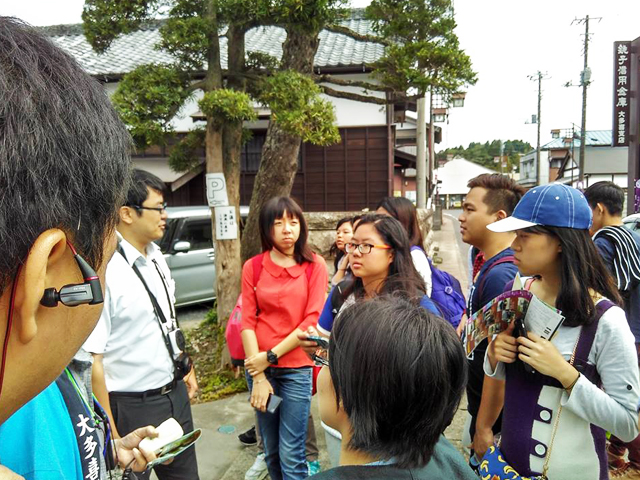
Students visiting Little Edo
As this was the first visit of UTAR students to JIU and JU, it enabled the ties between the universities to be further strengthened, with the representatives discussing on potential areas for further collaboration in future.
Since 2011, when an agreement was initially signed with Josai University Educational Corporation (JUEC) which operates JIU and JU, the universities have continued to express their strong interest to expand international collaborations in areas such as joint teaching and learning activities in Tourism, Environment, and Pharmaceutical and Health Sciences, and staff and student exchange programmes.
This builds on the already strong support from JIU and JU, who have been sending their students to enrol in UTAR’s English Language and cultural programmes, and who believe the collaborations will help develop a broad-minded international outlook that will contribute to students’ self-development and future success.
“Activities such as scholar exchanges, international internships and double degree programmes may be at the preliminary proposal stage, but we believe they could be carried out in the future, and thence enable UTAR students to further learn about the economic, social and cultural development of Japan. JIU and JU students would also benefit from being able to learn about the diverse Malaysian cultures from our students,” said Dr Au Yong.
With a farewell party marking the end of the study tour, the students bid sayonara to their hosts and thanked the JIU lecturers for the knowledge that they have so kindly imparted.
Despite the study tour having just ended, Computer Science student Ee Wei Yuan is already looking forward to the next study tour as he hopes to participate again. “I also encourage other students to participate in the programme because it will open your minds to knowledge of other cultures. Visiting JIU and JU has taught me the good disciplines of being punctual, honest, helpful and kind, which are greatly practised among the Japanese. Such good behaviours should be instilled and practised among Malaysians too,” said Ee.
Wholly owned by UTAR Education Foundation Co. No. 578227-M LEGAL STATEMENT TERM OF USAGE PRIVACY NOTICE